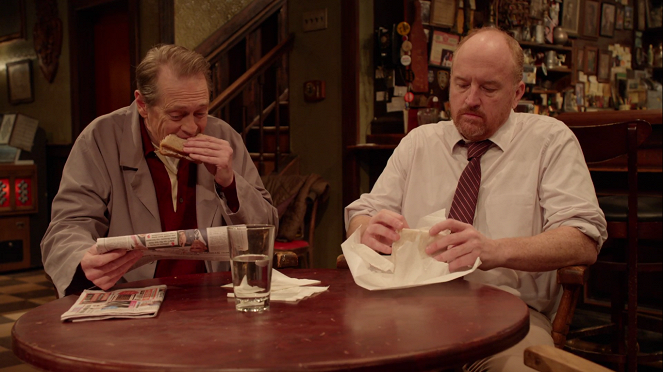Stoffentwicklung:
Louis C.K.Regie:
Louis C.K.Drehbuch:
Louis C.K.Kamera:
Paul KoestnerMusik:
Paul SimonBesetzung:
Louis C.K., Steve Buscemi, Edie Falco, Steven Wright, Kurt Metzger, Alan Alda, Jessica Lange, Aidy Bryant, Maria Dizzia, Nina Arianda, Laurie Metcalf (mehr)Folgen(10)
Kritiken (1)
“I'm living with a broken heart and I'm drinking and one of these days it’s going to kill me.” Television executives wouldn’t try viewers’ patience with the unnerving knowledge that anything could happen. Louis C.K., however, based his latest project on doing just that. In addition to the varying lengths of the episodes, the uncompromising treatment of the characters, the slow pacing and the theatrically minimalist style, he refuses to submit to the demand for exuberant and immersive television entertainment by making only minimal changes to the setting and the size of shots. The characters rarely leave the interior of the bar and even more rarely are they filmed other than with a static camera in half- or full-body shots. The artificiality of the set decorations is not hidden in any way. On the contrary, it is pointed out to us, which paradoxically adds emphasis to the genuineness of the emotions and the liveliness of the dialogue, which can touch a raw nerve and, thanks to the actors, does not have the hallmarks of theatricality, unlike everything else. C.K., however, maintains Aristotle’s unities of time, place and action, particularly in order to surprise us by abruptly violating them during the transition from reality to the unrealised sexual fantasy of one of the characters or a leap of many years back in time. ___ Though the series, with its maximally spare design bordering on amateurish, is rather more reminiscent of a thirty-year-old sitcom than a representative of the current wave of high-quality TV, the production of each episode cost roughly half a million dollars, which corresponds to the budget of a low-budget American indie film. Less than two months after the last episode aired, however, C.K. could boast that the series, with its many well-known actors and music composed by twelve-time Grammy winner Paul Simon, was already in the black. What’s more, this was done without the aid of traditional marketing and without using existing television or internet platforms. C.K. basically did it all by himself, as the degree of his creative input is truly exceptional. Though C.K. wrote, filmed, edited and produced the series, as well as playing the lead role, he does not push his own character to the forefront at the expense of his castmates, and he keeps a significant critical distance from the character of Horace, not giving him any more opportunity to do something than the others are given. The comparable weight of the individual characters’ voices is bound to the central theme of open discussion – the titular bar serves as a form of communication on social media, where everyone has an opinion and stubbornly defends it without regard for the arguments of others. C.K.’s willingness to suppress his own ego is also evidenced by the unusually generous space devoted to the dreams and wishes of the female characters, who act with greater determination than the men. ___ Horace and Pete deals with adult themes and doesn’t attempt make light of situations at all costs: life takes unpredictable paths, people die and (consciously) hurt each other, romantic ideas of love have long since faded, and the search for a way out leads to nowhere. Instead of trying to entertain us, Louis C.K. reminds us that we will also die someday. I can’t imagine a series like this getting approved by any of the established TV or cable channels (or Netflix or Amazon, for that matter), but I now know that something like this is not unthinkable. 80%
()
(weniger)
(mehr)

